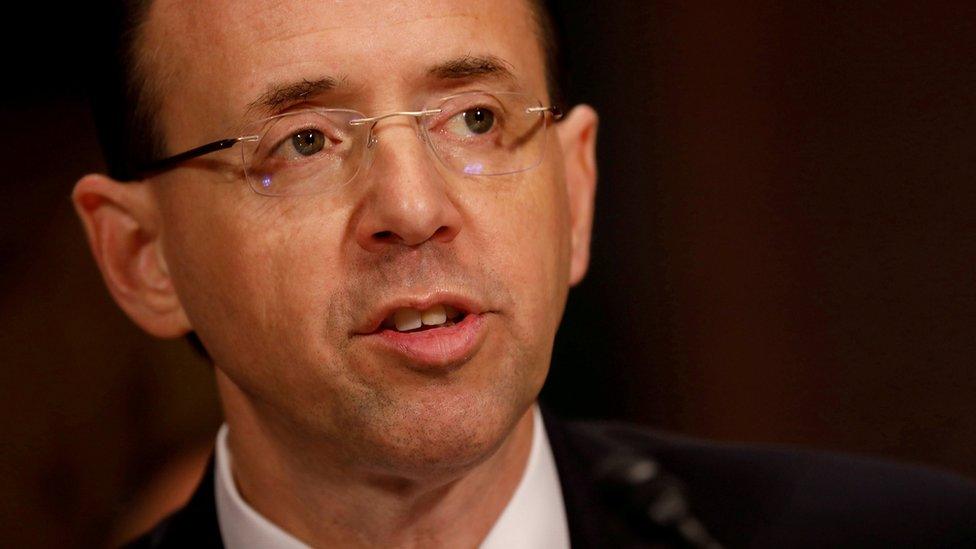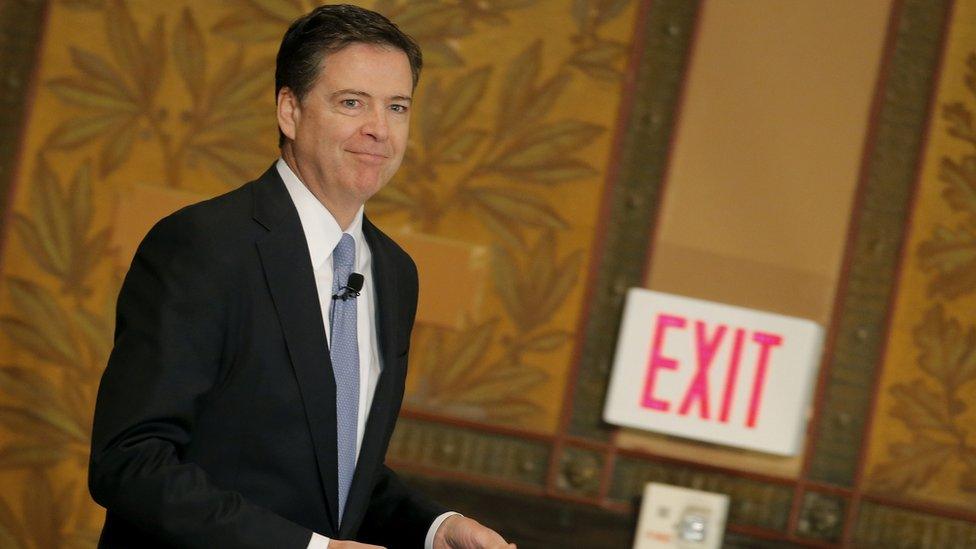Rod Rosenstein: Caught in the James Comey sacking storm
- Published

Deputy Attorney General Rod Rosenstein - once described as keen to avoid the political limelight
After just two weeks in office, Deputy Attorney General Rod Rosenstein finds himself suddenly at the centre of the storm over President Donald Trump's sudden sacking of FBI Director James Comey.
The White House has cast a memo written by him on Tuesday as the impetus for the move.
But critics say the 52-year-old Harvard graduate, with a reputation as straight-shooting and non-partisan, has been sucked into providing cover for Mr Trump to push out a man he desperately wanted rid of.
Mr Comey was leading the FBI investigation into alleged Russian interference in the November presidential election, including whether there was co-ordination between the Trump campaign and Russia.
And Mr Rosenstein is overseeing that probe, because his own boss, Attorney General Jeff Sessions, has recused himself from it after a row over contacts with the Russian ambassador to the US.
Indeed, senior Democrats say they believe Mr Comey had approached the deputy attorney general to request more resources for the investigation just days before the memo was written - although the department of justice has dismissed this as "false".

President Trump said sacked FBI chief James Comey was 'not doing a good job'
Mr Rosenstein received overwhelming bi-partisan support when the Senate voted 94-6 in favour at his confirmation hearing in April.
Before that, he had served as Maryland's chief federal prosecutor under President George W Bush.
Unusually, he was kept on under President Barack Obama and became the longest-serving US attorney with a 27-year-long career spanning five administrations.
The former Maryland Attorney General Doug Gansler described him in a recommendation letter in February as "totally by-the-book and completely apolitical", external.
And in that vein, Mr Rosenstein's memo comprises a litany of criticism over Mr Comey's failure to follow rules and procedures.
He said it was "wrong" of him to "usurp the attorney general's authority" in announcing his conclusion that the investigation into Hillary Clinton's emails should be closed without prosecution.
Trump's love-hate relationship with Comey over a tumultuous year
And he said Mr Comey's decision to hold a press conference, where he "laid out his version of the facts for the news media as if it were a closing argument, but without a trial" was a "textbook example of what federal prosecutors and agents are taught not to do".
But Democrats - and others - say the Trump administration, which had previously praised Mr Comey's actions, is using the memo as a smokescreen.
Former Deputy Attorney General Donald Ayer, who was quoted in the memo, described the "firing based it seems entirely on Comey's mishandling of the Clinton investigation" as "a sham".
Comey: Four theories for the axe
Russia: The scandal Trump can't shake
"The deputy [attorney general] should realise that his correct assessment of those mistakes is now being used to justify firing for a very different reason," he said in a statement.
So did President Trump ask Mr Rosenstein specifically to investigate Mr Comey's conduct?
When White House press secretary Sean Spicer was asked, he initially said "it was all him", external - of Rosenstein - but then corrected himself.
"I guess I shouldn't say that.... no-one from the White House. That was a DOJ [Department of Justice] decision," he said.
However, the Washington Post, citing unnamed White House officials, says Mr Trump called Mr Sessions - an ally of his - and Mr Rosenstein to a meeting on Monday and told them to explain in writing the case against Mr Comey.
Former justice department official Eric Columbus is among those noting that Mr Rosenstein stopped short of specifically recommending that Mr Comey be fired.
He suggested on Twitter that Mr Rosenstein "thought Comey screwed up but didn't want him fired with Russia investigation pending... yet Sessions wanted a memo on Comey's sins, and Rosenstein felt he had to oblige his boss."
The deputy attorney general must now decide what to do about growing demands from Democrats - and an unusually direct approach from the New York Times editorial board, external - to appoint an independent special prosecutor to investigate the Russia allegations.
Whatever the inside story, it all renders somewhat ironic another line in Mr Gansler's recommendation letter for Mr Rosenstein.
"Rod understands the importance of staying out of the political limelight."